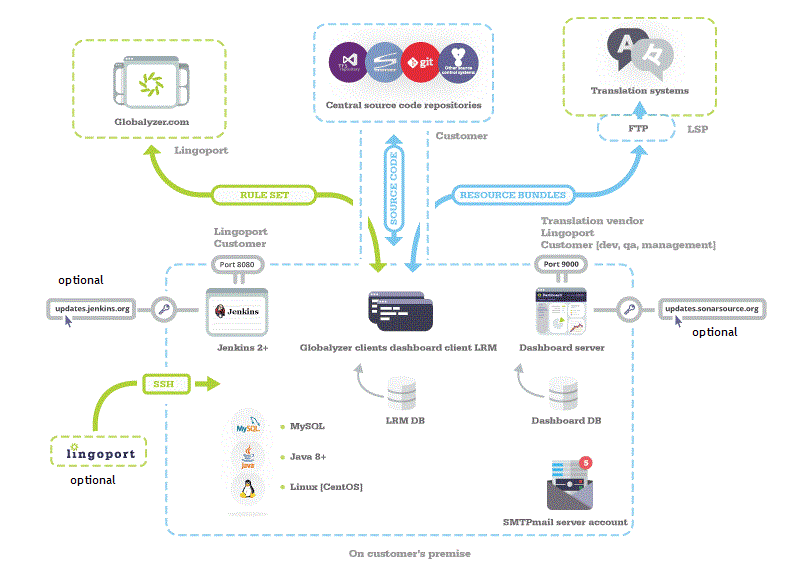Difference between revisions of "Deployment Scenarios"
| Line 1: | Line 1: | ||
The [[Terms_and_Definitions|Lingoport Suite]] is composed of a number of components. You may need some of the components for a set of users and other components for [[Terms_and_Definitions|Continuous Globalization]]. |
The [[Terms_and_Definitions|Lingoport Suite]] is composed of a number of components. You may need some of the components for a set of users and other components for [[Terms_and_Definitions|Continuous Globalization]]. |
||
| + | = Typical Deployment and Ports = |
||
| + | Setting up the [[Terms_and_Definitions|Lingoport Suite]] on a customer's system can be done in many ways, as shown in the different deployment scenarios. The following is meant to show the necessary access to the system. |
||
| + | |||
| + | |||
| + | |||
| + | *The Customer's systems are shown in Light Blue; <b>CentOS</b> for the main system where [[Terms_and_Definitions |Jenkins]] and [[Terms_and_Definitions|Dashboard]] reside. |
||
| + | *Access from outside the Customer's system are shown in Light Green. |
||
| + | |||
| + | [[Image:Deployment and Security.gif]] |
||
| + | |||
| + | == Ports == |
||
| + | * Jenkins is accessed via port 8080 |
||
| + | * Lingoport Dashboard is accessed via port 9000 |
||
| + | * The Translation Vendor may be accessed by different means, for instance port 21 for FTP or port 22 for SFTP. |
||
| + | * Access for the Lingoport (or internal) installation team can be done in many ways, such as SSH for Telnet or Putty. |
||
| + | * The system must be able to access https://globalyzer.com. |
||
| + | |||
| + | == Other aspects== |
||
| + | * Jenkins installation requires access to the Jenkins update site, http://updates.jenkins-ci.org |
||
| + | * Dashboard may require access to the SonarQube update site, http://update.sonarsource.org |
||
| + | * Notifications are sent using an SMTP account: The system must allow access to an SMTP server (e.g. smtp.gmail.com for Google) |
||
| + | |||
| + | |||
| + | = Additional possible deployments= |
||
In this section, we illustrate some possible deployments. |
In this section, we illustrate some possible deployments. |
||
* [[Globalyzer Workbench for i18n Specialists]] |
* [[Globalyzer Workbench for i18n Specialists]] |
||
| Line 10: | Line 34: | ||
| − | * [[Deployment and Security]] |
+ | <-- * [[Deployment and Security]] |
** Shows which ports need to be open for a typical installation. |
** Shows which ports need to be open for a typical installation. |
||
| + | --> |
||
Revision as of 21:57, 22 December 2016
The Lingoport Suite is composed of a number of components. You may need some of the components for a set of users and other components for Continuous Globalization.
Contents
Typical Deployment and Ports
Setting up the Lingoport Suite on a customer's system can be done in many ways, as shown in the different deployment scenarios. The following is meant to show the necessary access to the system.
- The Customer's systems are shown in Light Blue; CentOS for the main system where Jenkins and Dashboard reside.
- Access from outside the Customer's system are shown in Light Green.
Ports
- Jenkins is accessed via port 8080
- Lingoport Dashboard is accessed via port 9000
- The Translation Vendor may be accessed by different means, for instance port 21 for FTP or port 22 for SFTP.
- Access for the Lingoport (or internal) installation team can be done in many ways, such as SSH for Telnet or Putty.
- The system must be able to access https://globalyzer.com.
Other aspects
- Jenkins installation requires access to the Jenkins update site, http://updates.jenkins-ci.org
- Dashboard may require access to the SonarQube update site, http://update.sonarsource.org
- Notifications are sent using an SMTP account: The system must allow access to an SMTP server (e.g. smtp.gmail.com for Google)
Additional possible deployments
In this section, we illustrate some possible deployments.
- Globalyzer Workbench for i18n Specialists
- i18n Specialists use the powerful Globalyzer Workbench to refine rule sets and interactively internationalize applications.
- Globalyzer Lite for Developers
- Developers run Globalyzer Lite from within their Integrated Development Environments (IDEs), getting quick feedback on potential i18n issues within their code.
<-- * Deployment and Security
- Shows which ports need to be open for a typical installation.
-->
- Globalyzer Lite for Continuous Globalization
- Simple to set up.
- Lighter interface for Continuous Globalization.
- Projects can be analyzed concurrently.
- Globalyzer CLI for Continuous Globalization
- Powerful, with many options.
- Historically standard for Continuous Globalization.
- Projects must be analyzed one at a time.
- Globalyzer API for Continuous Globalization
- Most powerful and most flexible option.
- Requires writing your own Java program(s).
- Globalyzer and Check in Verification
- Analyze source code during commit check in.
- Reject commits that fail i18n requirements.
- LRM for Continuous Globalization
- Keeps tabs on the status of translations and resource files.
- Automates much of the translation process.
- Continuous Globalization
- Combination of the above sections.
